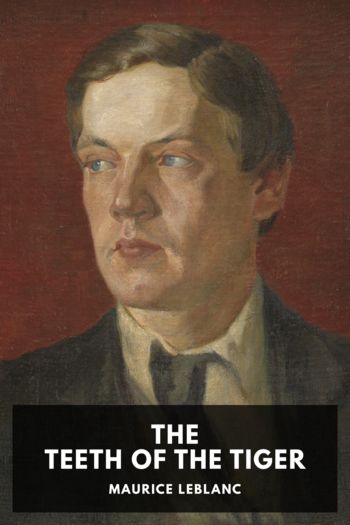The Crystal Stopper, Maurice Leblanc [i can read books TXT] 📗

- Author: Maurice Leblanc
Book online «The Crystal Stopper, Maurice Leblanc [i can read books TXT] 📗». Author Maurice Leblanc
Without the least suspicion, he said to one of the policemen:
“Go and tell that gentleman that I should like to ask him a few questions.”
They looked about for the gentleman. Someone had seen him standing on the steps, lighting a cigarette. The next news was that he had given cigarettes to a group of soldiers and strolled toward the lake, saying that they were to call him if he was wanted.
They called him. No one replied.
But a soldier came running up. The gentleman had just got into a boat and was rowing away for all he was worth. The commissary looked at Gilbert and realized that he had been tricked:
“Stop him!” he shouted. “Fire on him! He’s an accomplice! …”
He himself rushed out, followed by two policemen, while the others remained with the prisoners. On reaching the bank, he saw the gentleman, a hundred yards away, taking off his hat to him in the dusk.
One of the policemen discharged his revolver, without thinking.
The wind carried the sound of words across the water. The gentleman was singing as he rowed:
“Go, little bark,
Float in the dark …”
But the commissary saw a skiff fastened to the landing-stage of the adjoining property. He scrambled over the hedge separating the two gardens and, after ordering the soldiers to watch the banks of the lake and to seize the fugitive if he tried to put ashore, the commissary and two of his men pulled off in pursuit of Lupin.
It was not a difficult matter, for they were able to follow his movements by the intermittent light of the moon and to see that he was trying to cross the lakes while bearing toward the right—that is to say, toward the village of Saint-Gratien. Moreover, the commissary soon perceived that, with the aid of his men and thanks perhaps to the comparative lightness of his craft, he was rapidly gaining on the other. In ten minutes he had decreased the interval between them by one half.
“That’s it!” he cried. “We shan’t even need the soldiers to keep him from landing. I very much want to make the fellow’s acquaintance. He’s a cool hand and no mistake!”
The funny thing was that the distance was now diminishing at an abnormal rate, as though the fugitive had lost heart at realizing the futility of the struggle. The policemen redoubled their efforts. The boat shot across the water with the swiftness of a swallow. Another hundred yards at most and they would reach the man.
“Halt!” cried the commissary.
The enemy, whose huddled shape they could make out in the boat, no longer moved. The sculls drifted with the stream. And this absence of all motion had something alarming about it. A ruffian of that stamp might easily lie in wait for his aggressors, sell his life dearly and even shoot them dead before they had a chance of attacking him.
“Surrender!” shouted the commissary.
The sky, at that moment, was dark. The three men lay flat at the bottom of their skiff, for they thought they perceived a threatening gesture.
The boat, carried by its own impetus, was approaching the other.
The commissary growled:
“We won’t let ourselves be sniped. Let’s fire at him. Are you ready?” And he roared, once more, “Surrender … if not … !”
No reply.
The enemy did not budge.
“Surrender! … Hands up! … You refuse? … So much the worse for you … I’m counting … One … Two …”
The policemen did not wait for the word of command. They fired and, at once, bending over their oars, gave the boat so powerful an impulse that it reached the goal in a few strokes.
The commissary watched, revolver in hand, ready for the least movement. He raised his arm:
“If you stir, I’ll blow out your brains!”
But the enemy did not stir for a moment; and, when the boat was bumped and the two men, letting go their oars, prepared for the formidable assault, the commissary understood the reason of this passive attitude: there was no one in the boat. The enemy had escaped by swimming, leaving in the hands of the victor a certain number of the stolen articles, which, heaped up and surmounted by a jacket and a bowler hat, might be taken, at a pinch, in the semidarkness, vaguely to represent the figure of a man.
They struck matches and examined the enemy’s cast clothes. There were no initials in the hat. The jacket contained neither papers nor pocketbook. Nevertheless, they made a discovery which was destined to give the case no little celebrity and which had a terrible influence on the fate of Gilbert and Vaucheray: in one of the pockets was a visiting-card which the fugitive had left behind … the card of Arsène Lupin.
At almost the same moment, while the police, towing the captured skiff behind them, continued their empty search and while the soldiers stood drawn up on the bank, straining their eyes to try and follow the fortunes of the naval combat, the aforesaid Arsène Lupin was quietly landing at the very spot which he had left two hours earlier.
He was there met by his two other accomplices, the Growler and the Masher, flung them a few sentences by way of explanation, jumped into the motorcar, among Daubrecq the deputy’s armchairs and other valuables, wrapped himself in his furs and drove, by deserted roads, to his repository at Neuilly, where he left the chauffeur. A taxicab brought him back to Paris and put him down by the church of Saint-Philippe-du-Roule, not far from which, in the Rue Matignon, he





Comments (0)